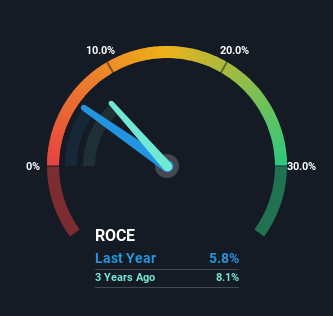- South Korea
- /
- Machinery
- /
- KOSE:A017800
Hyundai Elevator (KRX:017800) May Have Issues Allocating Its Capital
If we want to find a stock that could multiply over the long term, what are the underlying trends we should look for? One common approach is to try and find a company with returns on capital employed (ROCE) that are increasing, in conjunction with a growing amount of capital employed. This shows us that it's a compounding machine, able to continually reinvest its earnings back into the business and generate higher returns. Although, when we looked at Hyundai Elevator (KRX:017800), it didn't seem to tick all of these boxes.
Return On Capital Employed (ROCE): What Is It?
For those who don't know, ROCE is a measure of a company's yearly pre-tax profit (its return), relative to the capital employed in the business. Analysts use this formula to calculate it for Hyundai Elevator:
Return on Capital Employed = Earnings Before Interest and Tax (EBIT) ÷ (Total Assets - Current Liabilities)
0.058 = ₩119b ÷ (₩3.5t - ₩1.5t) (Based on the trailing twelve months to June 2024).
So, Hyundai Elevator has an ROCE of 5.8%. On its own, that's a low figure but it's around the 6.6% average generated by the Machinery industry.
Check out our latest analysis for Hyundai Elevator

Historical performance is a great place to start when researching a stock so above you can see the gauge for Hyundai Elevator's ROCE against it's prior returns. If you want to delve into the historical earnings , check out these free graphs detailing revenue and cash flow performance of Hyundai Elevator.
So How Is Hyundai Elevator's ROCE Trending?
On the surface, the trend of ROCE at Hyundai Elevator doesn't inspire confidence. Over the last five years, returns on capital have decreased to 5.8% from 8.7% five years ago. However, given capital employed and revenue have both increased it appears that the business is currently pursuing growth, at the consequence of short term returns. And if the increased capital generates additional returns, the business, and thus shareholders, will benefit in the long run.
While on the subject, we noticed that the ratio of current liabilities to total assets has risen to 42%, which has impacted the ROCE. Without this increase, it's likely that ROCE would be even lower than 5.8%. What this means is that in reality, a rather large portion of the business is being funded by the likes of the company's suppliers or short-term creditors, which can bring some risks of its own.
The Bottom Line
While returns have fallen for Hyundai Elevator in recent times, we're encouraged to see that sales are growing and that the business is reinvesting in its operations. In light of this, the stock has only gained 29% over the last five years. Therefore we'd recommend looking further into this stock to confirm if it has the makings of a good investment.
One final note, you should learn about the 4 warning signs we've spotted with Hyundai Elevator (including 1 which is potentially serious) .
While Hyundai Elevator may not currently earn the highest returns, we've compiled a list of companies that currently earn more than 25% return on equity. Check out this free list here.
Valuation is complex, but we're here to simplify it.
Discover if Hyundai Elevator might be undervalued or overvalued with our detailed analysis, featuring fair value estimates, potential risks, dividends, insider trades, and its financial condition.
Access Free AnalysisHave feedback on this article? Concerned about the content? Get in touch with us directly. Alternatively, email editorial-team (at) simplywallst.com.
This article by Simply Wall St is general in nature. We provide commentary based on historical data and analyst forecasts only using an unbiased methodology and our articles are not intended to be financial advice. It does not constitute a recommendation to buy or sell any stock, and does not take account of your objectives, or your financial situation. We aim to bring you long-term focused analysis driven by fundamental data. Note that our analysis may not factor in the latest price-sensitive company announcements or qualitative material. Simply Wall St has no position in any stocks mentioned.
About KOSE:A017800
Hyundai Elevator
Designs, manufactures, installs, maintains, and modernizes elevators in South Korea and internationally.
Undervalued with solid track record.
Market Insights
Community Narratives



